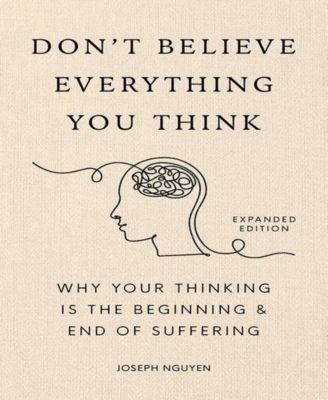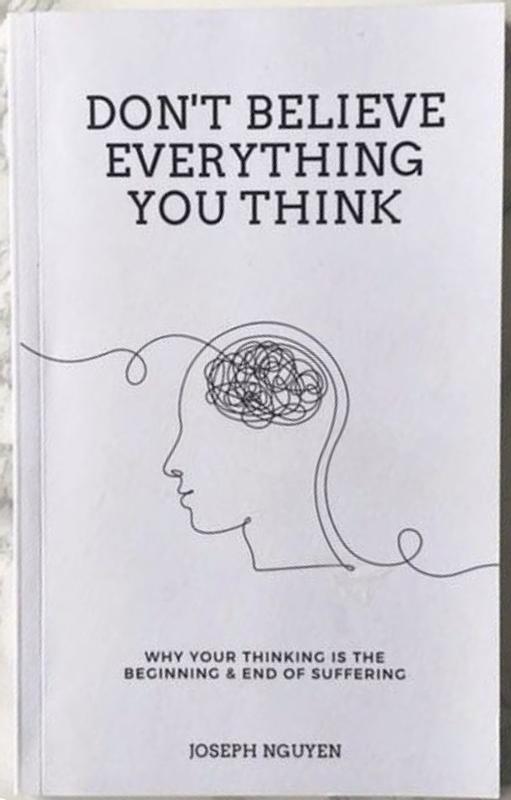Don't Believe Everything You Think Expanded Edition : Why Your Thinking Is The Beginning End Of Suffering by Joseph Nguyen
Product details
Web ID: 20312301Summary
Below is my summary from Littler Books. I hope you find it helpful! 1. Psychological suffering is produced by our internal reaction to external events. a. "Buddhists say that anytime we experience a negative event in our lives, two arrows fly our way. Being physically struck by an arrow is painful. Being struck by a second emotional arrow is even more painful (suffering). The Buddha explained, 'In life, we can't always control the first arrow. However, the second arrow is our reaction to the first. The second arrow is optional.'" 2. We don't experience objective reality. We experience our personal thinking about reality, and the meaning we assign to events determines our feelings. 3. 100 people can interpret the same job, president, or cup of coffee 100 different ways. 4. Since feelings arise from thought, the true source of psychological suffering is our own thinking. 5. The human mind's primary function evolved for survival, not happiness. Its job is to constantly scan for potential threats based on past experiences and hypothetical futures. Relying solely on this outdated survival mechanism in the modern world leads to chronic negative emotions. 6. Thoughts are effortless, neutral ideas that pop into our minds. Thinking is the deliberate act of judging and analyzing those thoughts. Thinking is the root of psychological suffering, as it's the process where we apply our limiting beliefs to a neutral thought. 7. Positive emotions like joy and love are our natural state of being (babies are not self-conscious). 8. Negative emotions are caused by the act of thinking itself. The intensity of our suffering is directly proportional to the intensity of thinking we do. a. "We do not have to try to 'think positive' to experience love, joy, bliss, and any positive emotions we want because it is our natural state to feel those emotions. The only times we don't naturally feel these emotions is when we begin to think about the thoughts we're having." 9. The human experience is created by the combination of three principles: Universal Mind (the intelligent energy behind all life, some call this God), Consciousness (the awareness that makes experience possible), and Thought (the creative power to form our reality). a. Recognize that feelings of distress are only temporary Thoughts passing through Consciousness, and that we're all a part of the Universal Mind. 10. Do not actively fight or stop thoughts, but simply become aware that you are engaged in thinking. This awareness creates detachment and allows the mind to settle on its own, similar to how murky water becomes clear when left undisturbed. 11. Our highest level of performance occurs in a flow state where there's little conscious thought and actions arise automatically from training and intuition. Overthinking leads to anxiety, hesitation, and ego-driven limits. 12. Not overthinking does not mean abandoning ambitions. Rather, it allows you to distinguish between goals created from desperation versus those from inspiration. Goals from desperation are driven by fear and scarcity. These lead to stress and emptiness. Goals from inspiration arise naturally and lead to joy. 13. Fulfillment comes from unconditional love and creation. Unconditional love arises when we stop attaching reasons to our affection. It comes from within, untied to traits or reciprocity. Unconditional creation is when we create for the sheer joy of creating, not as a means to an end. 14. Acknowledge that negative feelings like doubt and anxiety will naturally return as the ego tries to regain control. Squash them by remembering that your thinking is their only cause. 15. Events, decisions, and political views are inherently neutral. It is our thinking that applies labels like "good" or "bad." This judgment is the source of our negative emotions. Instead of judging, seek universal truth from within. a. “If it is 'true' for one person, but not for another, then it is not universal truth.” 16. Rely on your intuition, as you often already know what to do deep down. Recognize that fear and self-doubt are the main reasons you think you don't know what to do. a. “For instance, if we want to lose weight, most of us know exactly what we need to do. The formula to losing weight isn't rocket science … For anything in life, you most likely already know deep down what to do, but are afraid of doing it or don't believe that you are good enough to do it.” b. Enter a state of non-thinking (flow) to connect with your intuition. Your role is to know what you want, don't try to control how it will happen. 17. To receive new ideas, solutions, or "miracles," you must first create mental space by emptying your mind of the old. A cup must be empty before it can be filled. a. This practice was used by Einstein and Edison. 18. Sustained non-thinking feels unusually peaceful and productive, but the mind may label this unfamiliar calm as something's wrong. Recognize this is just your mind trying to return to familiar suffering.
Recommends this product

Customer review from barnesandnoble.com
Inspiration
This book was an inspiration when i read through
Recommends this product

Customer review from barnesandnoble.com
Excellent book
This book really spoke to. The author has a warm and genuine writing style. I absolutely have taken away a lot of the insight that he has given in regards to thoughts and thinking and how they are not the same. I will read this book again and definitely reference it going forward. I am going to recommend this book to my family and friends.
Recommends this product

Customer review from barnesandnoble.com
The book that got me to read a WHOLE BOOK!
This book helps my thought process to the point where im living in the day instead of just trying to get through the day. I much more aware of how many negative thoughts that i fight everyday. I also realize how much my thoughts plays a role of the emotional attachment i have that is so unhealthy. A small book with so much information in the simplest form to understand. Buy the book.

Customer review from barnesandnoble.com
This Book Will Get You Thinking!
The author clearly explains how simple changes can make a big impact in your mental health! The differences between thoughts and thinking are clarified. Examples create a vivid picture of how thinking can change into toxic rumination and catastrophizing. A must-read for overthinkers and those who struggle with negative self-talk!
Recommends this product

Customer review from barnesandnoble.com
Initially, I was skeptical…
Two years ago, I hit rock bottom. I felt trapped in the aftermath of a costly decision, overwhelmed by fear, shame, and hopelessness. A mentor at the time recommended this book. Initially, I was skeptical, having read numerous self-help books that offered vague theories and methods of self-development. However, I decided to give it a try, and I’m so glad I did. This book is not only easy to read and understand, but Joseph provides a practical approach to shifting your mindset. He helps readers transition from overthinking and believing every thought to operating from a place of awareness. The central idea is that you no longer have to be a passenger in your thought process, driven by your ego. This conscious way of living requires daily practice, but the rewards are profound. If you take the time to absorb each chapter, this book has the potential to transform your entire approach to life. Joseph’s insights helped me immensely during a time when I needed it most. I am eternally grateful for the time and energy he invested in creating this book and highly recommend getting a copy. I’ve read it 5-6 times now and learn something new every time.
Recommends this product

Customer review from barnesandnoble.com


